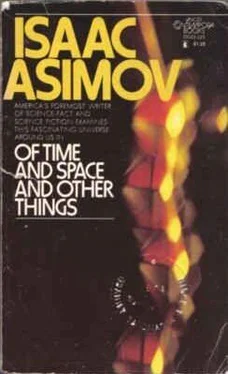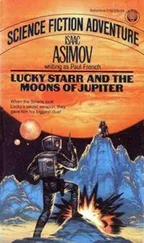Isaac Asimov - Of Time and Space and Other Things
Здесь есть возможность читать онлайн «Isaac Asimov - Of Time and Space and Other Things» весь текст электронной книги совершенно бесплатно (целиком полную версию без сокращений). В некоторых случаях можно слушать аудио, скачать через торрент в формате fb2 и присутствует краткое содержание. Год выпуска: 1972, ISBN: 1972, Издательство: Lancer Books, Жанр: Прочая научная литература, на английском языке. Описание произведения, (предисловие) а так же отзывы посетителей доступны на портале библиотеки ЛибКат.
- Название:Of Time and Space and Other Things
- Автор:
- Издательство:Lancer Books
- Жанр:
- Год:1972
- ISBN:ISBN: 0-447-33023-3
- Рейтинг книги:4 / 5. Голосов: 1
-
Избранное:Добавить в избранное
- Отзывы:
-
Ваша оценка:
- 80
- 1
- 2
- 3
- 4
- 5
Of Time and Space and Other Things: краткое содержание, описание и аннотация
Предлагаем к чтению аннотацию, описание, краткое содержание или предисловие (зависит от того, что написал сам автор книги «Of Time and Space and Other Things»). Если вы не нашли необходимую информацию о книге — напишите в комментариях, мы постараемся отыскать её.
Of Time and Space and Other Things — читать онлайн бесплатно полную книгу (весь текст) целиком
Ниже представлен текст книги, разбитый по страницам. Система сохранения места последней прочитанной страницы, позволяет с удобством читать онлайн бесплатно книгу «Of Time and Space and Other Things», без необходимости каждый раз заново искать на чём Вы остановились. Поставьте закладку, и сможете в любой момент перейти на страницу, на которой закончили чтение.
Интервал:
Закладка:
In addition, the Germans were the nineteenth-century scientists par excellence, and to speak Russian with a German accent probably leiit distinction to a scientist.
(And before you sneer at this point of view, just think of the American stereotype of a rocket scientist. He has a thick German accent, nicht wahr?-And this despite the fact that the first rocketman, and the one whose experi ments started the Germans on the proper track [Robert Goddard], spoke with a New England twang.)
So it happened that the Imperial Academy of Sciences of the Russian Empire (the most prestigious scientific organization in the land) was divided into a "German party" and a "Russian party," with the former dominant.
In 1880 there was a vacancy in the chair of chemical technology at the Academy, and two names were proposed.
The German party proposed Beilstein, and the Russian party proposed Mende]6ev. There was no comparison really. Beilstein spent years of his life preparing an encyclo pedia of the properties and methods of preparation of many thousands of organic compounds which, with nu merous supplements and additions, is still a chemical bible.
This is a colossal monument to his thorough, hard-work ing competence-but' it is no more. Mendel6ev, who worked out the periodic table of the elements, was, on the other hand, a chemist of the first magnitude-an un doubted genius in the field.
Nevertheless, government officials threw,their weight be bind Beilstein, who was elected by a vote of ten to nine.
It is no wonder, then, that in recent years, when the Russians have finally won a respected place in the scientific sun, they tend to overdo things a bit. They've got a great deal of humiliation to make up for.
That ends the digression, so I'll start over As the nineteenth century wore on, more examples of baste-making were discovered. In 1812, for instance, the Russian chemist Gottlieb Sigismund Kirchhoff found that if he boiled starch in water to which a small amount of sulfuric acid had been added, the starch broke down to a simple form of sugar, one that is now called glucose. This would not happen in the absence of acid. When it did happen in the presence of acid, that acid was not consumed but was still present at the end.
Then, in 1816, the English chemist Humphry Davy found that certain organic vapors, such as those of alcohol, combined with oxygen more easily in the presence of metals such as platinum. Hydrogen combined more easily with oxygen in the presence of platinum also.
Fun and games with platinum started at once. In 1823 a German chemist, Johann Wolfgang Debereiner, set up a hydrogen generator which, on turning an appropriate stop cock, would allow a jet of hydrogen to shoot out against a strip of platinum foil. The hydrogen promptly burst into flame and "Dbbereiner's lamp" was therefore the first cigarette lighter. Unfortunately, impurities in the hydrogen gas quickly "poisoned" the expensive bit of platinum and rendered it useless.
In 1831 an English chemist, Peregrine Phillips, reasoned that if platinum could bring about the combination of hydrogen and of alcohol with oxygen, why should it not do the same for sulfur dioxide? Phillips found it would and patented the process. It was not for years afterward, how ever, that methods were discovered for delaying the poisoning of the metal, and it was only after that that a platinum catalyst could be profitably used in sulfuric acid manufacture to replace Ward's saltpeter.
In 1836 such phenomena were brought to the attention of the Swedish chemist J6ns Jakob Berzelius who, during the first half of the nineteenth century, was the uncrowned king of chemistry. It was he who suggested the words "catalyst" and "catalysis" from Greek words meaning "to break down" or "to decompose." Berzelius had in mind such examples of catalytic action as the decomposition of the large starch molecule into smaller sugar molecules by the action of acid.
But platinum introduced a new glamor to the concept of catalysis. For one thing, it was a rare and precious metal. For another, it enabled people to begin suspecting magic again.
Can platinum be expected to behave as a middleman as saltpeter does?
At first blush, the answer to that would seem to be in the negative. Of all substances, platinum is one of the most inert. It doesn't combine with oxygen or hydrogen under any normal circumstances. How, then, can it cause the two to combine?
If our metaphorical catalyst is a bricklayer, then plati num can only be a bricklayer tightly bound in a strait jacket.
Well, then, are we reduced to magic? To molecular action at a distance?
Chemists searched for something more prosaic. The suspicion grew during the nineteenth century that the inert ness of platinum is, in one sense at least, an illusion. In the body of the metal, platinum atoms are attached to each other in all directions and are satisfied to remain so. In bulk, then, platinum will not react with oxygen or hydro gen (or most other chemicals, either).
On the surface of the platinum, however, atoms on the metal boundary and immediately adjacent to the air have no other platinum atoms, in the air-direction at least, to attach themselves to. Instead, then, they attach themselves to whatever atoms or molecules they find handy oxygen atoms, for instance. This forms a thin film over the surface, a film one molecule thick. It is completely invisible, of course, and all we see is a smooth, shiny, platinum sur face, which seems completely nonreactive and inert.
As parts of a surface film, cixygen and hydrogen react more readily than they do when making up bulk gas.
Suppose, then, that when a water molecule is formed by the combination of hydrogen and oxygen on the platinum surface, it is held more weakly than an oxygen molecule would be. The moment an oxygen molecule struck that portion of the surface it would replace the water molecule in the film. Now there would be the chance for the forma tion of another water molecule, and so on.
The platinum does act as a middleman after all, through its formation of the monomolecular gaseous film.
Furthermore, it is also easy to see how a platinum catalyst can be poisoned. Suppose there are molecules to which the platinum atoms will cling even more tightly than to oxygen. Such molecules will replace oxygen wherever it is found on the film and will not themselves be replaced by any gas in the atmosphere. They are on the, platinum sur face to stay, and any catalytic action involving hydrogen or oxygen is killed.
Since it takes very little substance to form a layer merely one molecule thick over any reasonable stretch of surface, a catalyst can be quickly poisoned by impurities that are present in the working mixture of gases, even when those impurities are present only in trace amounts. . If this is all so, then anything which increases the amount of surface in a given weight of metal will also increase the catalytic efficiency. Thus, powdered platinum, with a great deal of surface, is a much more effective catalytic agent than the same weight of bulk platinum. It is perfectly fair, therefore, to speak of "surface catalysis."
But what is there about a surface film that hastens the process of, let us say, hydrogen-oxygen combination? We still want to remove the suspicion of magic.
To do so, it helps to recognize what catalysts can't do.
For instance, in the 187Ws, the American physicist Josiah Willard Gibbs painstakingly worked out the applica tion of the laws of thermodynamics to chemical reactions.
He showed that there is a quantity called "free energy" which always decreases in any chemical reaction that is spontaneous-that is, that proceeds without any input of energy.
Thus, once hydrogen and oxygen start reacting, they keep on reacting for as long as neither gas is completely used up, and as a result of the reaction water is formed. We explain this by saying that the free energy of the water is less than the free energy of the hydrogen-oxygen mixture.
Читать дальшеИнтервал:
Закладка:
Похожие книги на «Of Time and Space and Other Things»
Представляем Вашему вниманию похожие книги на «Of Time and Space and Other Things» списком для выбора. Мы отобрали схожую по названию и смыслу литературу в надежде предоставить читателям больше вариантов отыскать новые, интересные, ещё непрочитанные произведения.
Обсуждение, отзывы о книге «Of Time and Space and Other Things» и просто собственные мнения читателей. Оставьте ваши комментарии, напишите, что Вы думаете о произведении, его смысле или главных героях. Укажите что конкретно понравилось, а что нет, и почему Вы так считаете.












